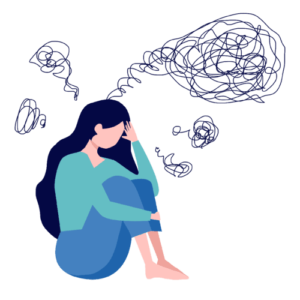
Health OCD Assessment
Answer these simple questions to understand more about Health OCD Assessment. We share instant results and keep your information confidential.

What is Health OCD Assessment?
Health OCD Assessment involves evaluating individuals for symptoms of Obsessive-Compulsive Disorder (OCD) specifically related to health concerns. This assessment typically includes structured interviews and standardized questionnaires to gauge the presence and severity of health-related obsessions and compulsions. Individuals with health OCD may experience distressing and irrational fears about having serious illnesses, leading to compulsive behaviors like excessive checking, reassurance-seeking, or avoidance of triggers. Clinicians use this assessment to diagnose the condition, determine its impact on daily life, and tailor appropriate treatments such as cognitive-behavioral therapy and, in some cases, medication to alleviate symptoms and improve overall well-being.
Who can benefit from this Health OCD Assessment?
The Health OCD Assessment can benefit individuals who suspect they might be experiencing health-related obsessive-compulsive disorder (OCD). This tool is valuable for those who constantly worry about their health, engage in excessive checking or reassurance seeking, and experience distress due to intrusive health-related thoughts. It aids those seeking self-awareness, as well as provides insights to mental health professionals for accurate diagnosis and treatment planning. By identifying the presence and severity of health-related OCD symptoms, the assessment assists individuals in understanding their condition and taking appropriate steps towards managing their mental health, ultimately improving their overall well-being and quality of life.


Health OCD Assessment Accuracy
Health OCD, also known as illness anxiety disorder, involves excessive worry about having a serious medical condition. Accurate assessment is essential for proper diagnosis and treatment. Psychological professionals, through in-depth interviews and standardized assessments, evaluate symptoms, duration, and functional impairment. However, misdiagnosis can occur due to overlapping symptoms with other disorders. Collaborative assessment, including medical evaluation to rule out physical causes, enhances accuracy. Regular reassessment aids in tracking progress. Accurate diagnosis facilitates tailored cognitive-behavioral therapy, medication, and psychoeducation, improving patient outcomes.
Types of Health OCD Assessment
Clinical Interview:
Mental health professionals conduct detailed interviews with the individual to gather information about their symptoms, thought patterns, and behaviors related to health concerns. This helps in understanding the severity and impact of the health-related obsessions and compulsions.
Structured Clinical Interviews:
These are standardized interviews that follow a predetermined set of questions and prompts to assess the presence of health-related obsessions and compulsions, as well as other symptoms of OCD.
Questionnaires and Self-Report Scales:
Various self-report assessment tools are used to measure the severity of health-related obsessions and compulsions. Some commonly used scales include:
- Illness Attitudes Scale (IAS)
- Whitely Index (WI)
- Health Anxiety Inventory (HAI)
Yale-Brown Obsessive Compulsive Scale (Y-BOCS):
Although not specific to health-related obsessions, this widely used scale assesses the severity of OCD symptoms, including obsessions and compulsions.
Structured Diagnostic Interviews:
These interviews, such as the Mini International Neuropsychiatric Interview (MINI) or the Structured Clinical Interview for DSM-5 (SCID-5), are designed to provide a structured way of diagnosing various mental disorders, including OCD and health-related concerns.
Clinical Assessment of Illness Severity:
Mental health professionals evaluate the impact of health-related obsessions and compulsions on daily functioning, social relationships, and overall well-being.
Handling Health OCD Issues
I am not a substitute for professional medical advice, but I can offer some general suggestions for handling health-related obsessive-compulsive disorder (OCD) issues. If you’re struggling with OCD, it’s important to consult a mental health professional for personalized guidance and treatment. That being said, here are some strategies that might be helpful:
- Seek Professional Help: OCD is a mental health condition that often requires professional intervention. A therapist, psychiatrist, or psychologist with experience in treating OCD can provide you with the necessary tools and strategies to manage your symptoms.
- Cognitive Behavioral Therapy (CBT): CBT, especially a subtype called Exposure and Response Prevention (ERP), is a highly effective treatment for OCD. It involves gradually exposing yourself to anxiety-provoking situations and then resisting the compulsions that you would typically engage in. Over time, this can help reduce the power of your obsessions and compulsions.
- Medication: In some cases, medication may be prescribed by a psychiatrist to help manage the symptoms of OCD. Selective serotonin reuptake inhibitors (SSRIs) are commonly used for this purpose.
- Educate Yourself: Learning about OCD and how it works can help you understand your condition better. Understanding that your obsessions are a result of an overactive brain response and not based on reality can be reassuring.
- Practice Mindfulness and Relaxation Techniques: Mindfulness meditation and deep breathing exercises can help you manage anxiety and stress associated with OCD. These practices can teach you to stay in the present moment and let go of distressing thoughts.
- Challenge Negative Thoughts: Work on recognizing and challenging the irrational thoughts that fuel your OCD. Ask yourself if there’s any concrete evidence to support your fears or if you’re catastrophizing. Practice reframing these thoughts with more realistic and rational ones.
- Create a Hierarchy: Make a list of situations or triggers that cause anxiety related to health concerns. Rank them from least anxiety-provoking to most anxiety-provoking. Gradually work your way up the hierarchy, facing each situation while resisting compulsions.
- Practice Self-Compassion: Be kind to yourself. Understand that dealing with OCD is challenging, and setbacks can happen. Don’t beat yourself up if you struggle with certain thoughts or behaviors.
- Build a Support System: Share your struggles with friends and family members who are understanding and supportive. Having someone you can talk to when you’re feeling anxious can be very beneficial.
- Limit Reassurance Seeking: Constantly seeking reassurance from others or the internet can actually reinforce your OCD. Try to limit this behavior to break the cycle of anxiety and relief.
Remember that overcoming OCD takes time and persistence. A qualified mental health professional can provide you with a personalized treatment plan that’s tailored to your needs. If you’re experiencing severe distress or impairment due to OCD, seek help as soon as possible.